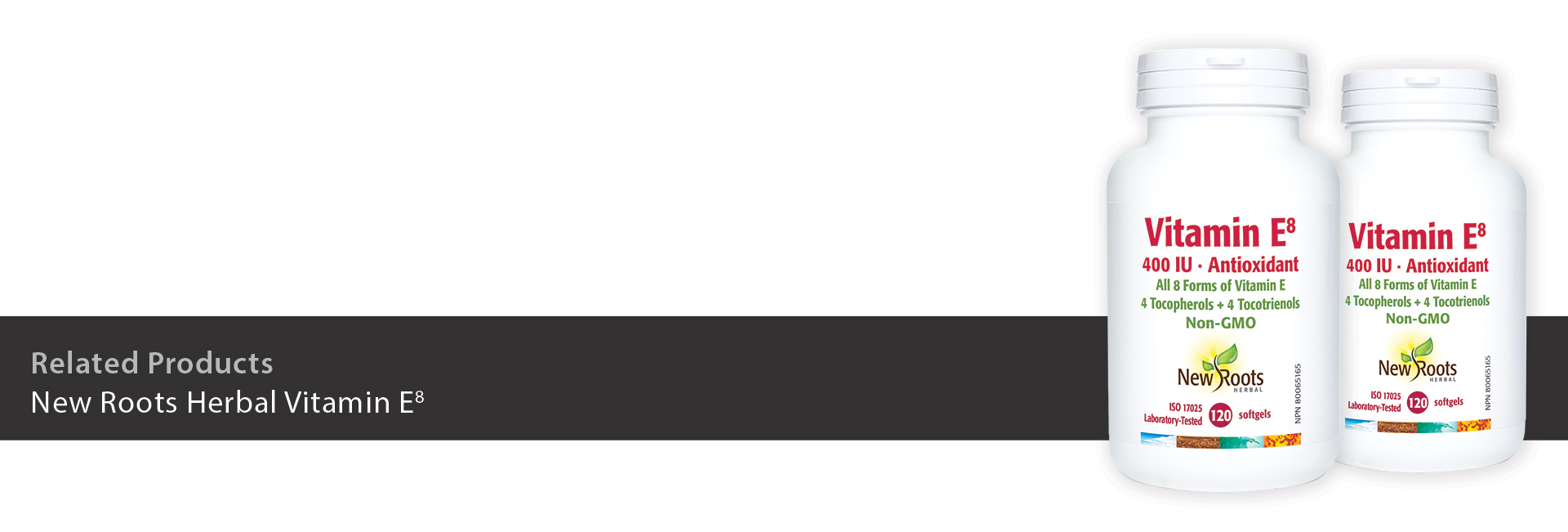Better Health is as Easy as ABCD “E”
Vitamin E is a naturally occurring antioxidant found in plant-based oils such as sunflower, safflower, and wheat germ; almonds, peanuts, pumpkin, red bell peppers, kale, beet greens, and spinach are also good dietary sources. It exists in eight natural, biologically active forms; a family of compounds which includes four tocopherols along with four tocotrienols.
The ability of plants to synthesize these compounds is among the critical biochemical processes for the evolution of life on earth. The antioxidant action of vitamin E within seeds gives them the resiliency to exploit a wide variety of ecological niches. It protects their delicate DNA while preserving their carbon-based energy stores, often for many years, for germination when favourable conditions prevail.
The relevance for our health is that the entire eight members of this group of lipid-soluble vitamins are essential: Our bodies can’t make them. The good news is, we can harvest these benefits via dietary means, assuming we eat enough greens and legumes. Let’s be honest: Most of us don’t, so supplementation is important. Vitamin E safeguards health at the cellular level from lipid peroxidation, the process where free radicals (atoms or molecules that lack an electron) steal electrons from cells; a destructive process which leaves us prone to disease and illness. It can also give skin an appearance that may regrettably exceed its biological age. The antioxidant process is simple: Vitamin E donates an electron to a free radical, thereby neutralizing it. Consider it a peace offering to a predator.
Cells throughout the body are under constant oxidative stress; this accounts for the fact virtually every tissue and organ system can benefit from naturally sourced vitamin E. It’s easily recognized, absorbed, and transported throughout the blood stream. The initial benefit of vitamin E supplementation is discovered “en passant,” as it has been shown to inhibit oxidation of low-density lipoproteins (LDL cholesterol) that cling to arterial walls. The resulting plaque formation causes hardening and narrowing of the arteries known as atherosclerosis. Plaque formation can also build up in the brain and contribute to cognitive decline. Current research also points to the antioxidant role vitamin E can play for slowing down the onset of neurological conditions and diseases. Kidney, liver, and epidermal health are among the many organ systems that also benefit from vitamin E consumption and supplementation.
Symptoms of a deficiency can include muscle weakness, numbness and tingling in extremities, vision deterioration, and a compromised immune system. These are conditions which unfortunately can easily be attributed to other causes. Blood analysis can determine whether there is a deficiency and supplementation is required. Potency for vitamin E is measured with international units (IU): New Roots Herbal VitaminE⁸ delivers the full spectrum of naturally sourced and non-GMO benefits of sunflower sourced vitamin E in both 200 and 400 IU formats.
